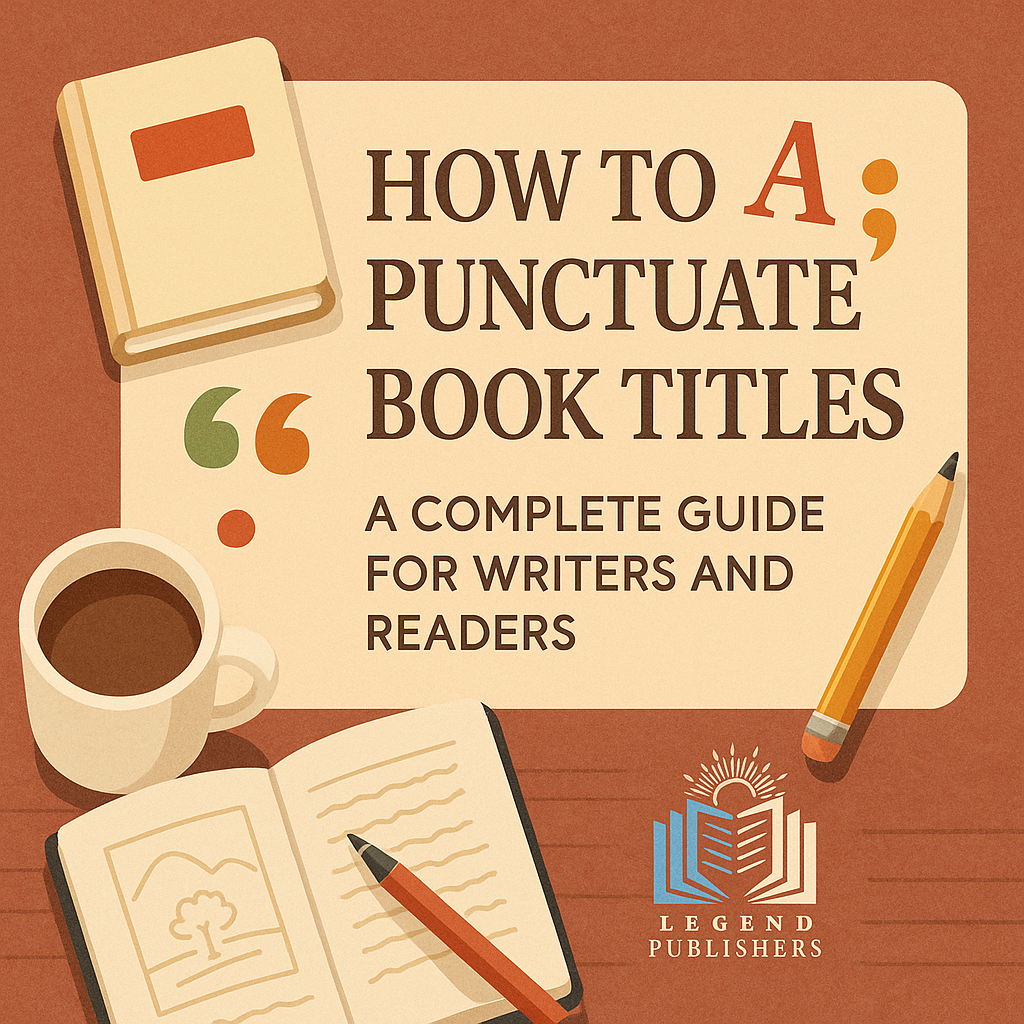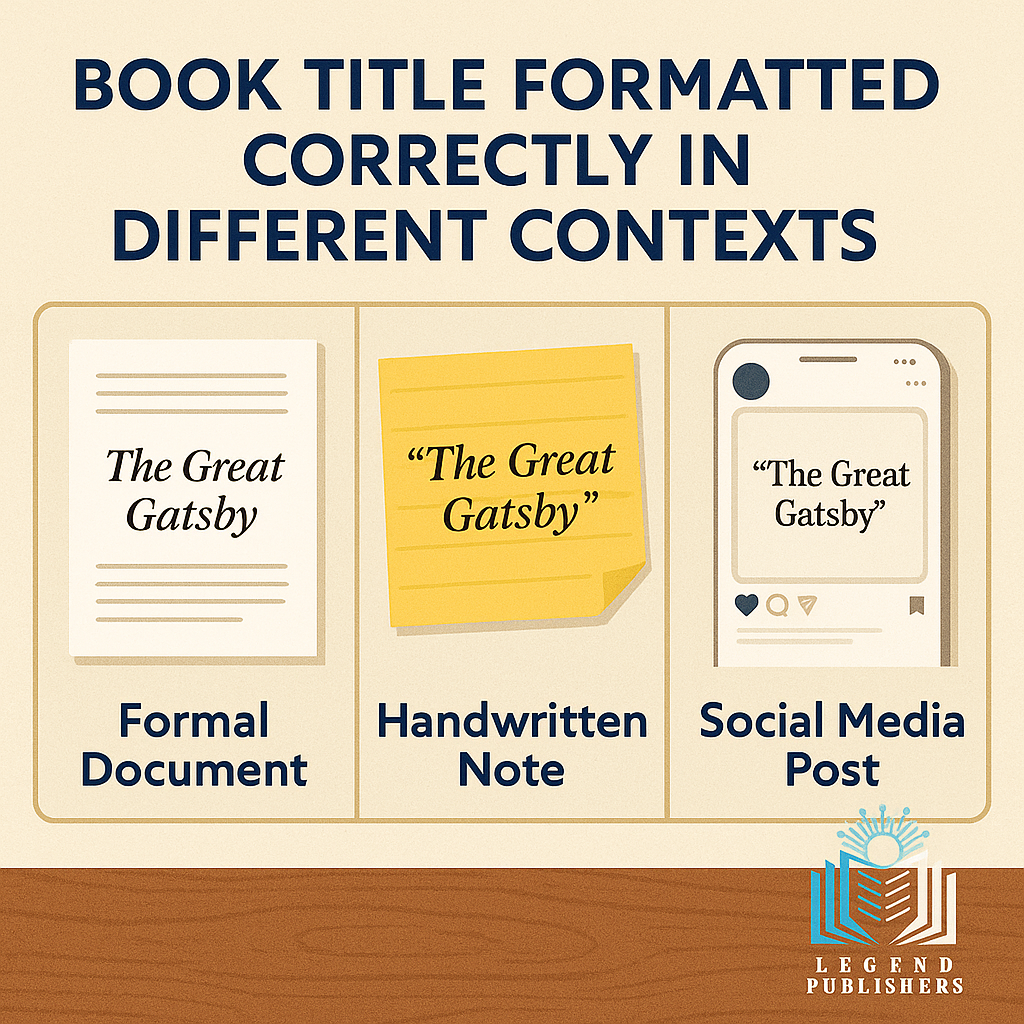
How to Punctuate Book Titles: The Complete Author’s Guide
Learning how to punctuate book titles correctly is essential for every author, editor, and publishing professional. Whether you’re writing a manuscript, creating marketing materials, or formatting your book for publication, proper book title punctuation establishes credibility and professionalism.
How to Punctuate Book Titles: The Fundamentals
The rules for punctuating book titles aren’t arbitrary—they serve specific purposes in written communication. Proper formatting helps readers immediately identify what constitutes a complete work versus shorter pieces like articles or poems. More importantly for authors, consistent book title punctuation demonstrates attention to detail that readers and industry professionals expect.
At Legend Publishers, we’ve seen countless manuscripts where authors struggle with basic formatting rules. These seemingly small errors can undermine otherwise excellent writing and create barriers to publication success. Understanding how to punctuate book titles properly is a fundamental skill that separates amateur writers from publishing professionals.
The basic principle is straightforward: book titles should be italicized in most modern writing contexts. However, the reality involves multiple style guides, various contexts, and numerous exceptions that can confuse even experienced writers. This comprehensive guide will eliminate that confusion and provide clear, actionable rules you can apply immediately.

Book title punctuation extends beyond just italics or quotation marks. It includes capitalization rules, punctuation within titles, and formatting considerations that vary depending on whether you’re writing for academic, commercial, or digital contexts.
Book Title Punctuation Rules by Style Guide
Different style guides have varying approaches to book title punctuation, and understanding these differences is crucial for authors targeting specific markets or publications.
MLA Style (Modern Language Association)
MLA style, primarily used in humanities and literature, requires italicizing book titles in all contexts. This includes novels, non-fiction books, poetry collections, and any standalone published work.
Examples:
- To Kill a Mockingbird revolutionized American literature.
- Harper Lee’s Go Set a Watchman sparked considerable controversy.
- The anthology Best American Short Stories 2023 features emerging voices.
APA Style (American Psychological Association)
APA style, dominant in social sciences, also italicizes book titles but has specific rules for capitalization that differ from other guides.
APA Title Capitalization:
- Capitalize the first word
- Capitalize the first word after a colon
- Capitalize proper nouns
- Use lowercase for everything else
Example: The psychology of human behavior: Understanding motivation and decision-making
Chicago Manual of Style
Chicago style, preferred by many publishers and professional editors, italicizes book titles and follows headline-style capitalization (capitalizing major words).
Example: The Great Gatsby: A Study in American Dreams and Disillusionment
AP Style (Associated Press)
AP style, used in journalism, puts book titles in quotation marks rather than italics, primarily because newspapers traditionally couldn’t print italics.
Example: “The Catcher in the Rye” remains controversial in many school districts.
Understanding which style guide your target publication or market uses is essential. At Legend Publishers, our editing services ensure your manuscript follows the appropriate style guide consistently throughout.
Italics vs Quotation Marks: When to Use Each
The choice between italics and quotation marks for book title punctuation depends on context, medium, and style guide requirements. Understanding when to use each format prevents common formatting errors.
Use Italics For:
- Full-length books (novels, non-fiction, poetry collections)
- Published works in digital and print formats
- Academic and professional writing
- Modern style guides (MLA, APA, Chicago)
Use Quotation Marks For:
- Handwritten documents where italics aren’t possible
- Some newspaper and journalism contexts (AP style)
- When italics aren’t available in your publishing platform
- Social media posts where formatting is limited
Digital Considerations
Online platforms handle formatting differently. While most word processors and websites support italics, some social media platforms or older systems might not. In these cases, quotation marks provide an acceptable alternative.
Platform-Specific Guidelines:
- Amazon listings: Use italics in product descriptions
- Social media: Quotation marks if italics aren’t supported
- Email marketing: Italics usually supported in HTML emails
- Text messages: Quotation marks for clarity
The key is consistency within each document or platform. Don’t mix italics and quotation marks for book titles within the same piece of writing unless style requirements specifically dictate different treatment.

Capitalization Rules for Book Titles
Proper capitalization is a crucial aspect of book title punctuation that varies significantly between style guides and contexts. Getting this right demonstrates professionalism and attention to detail.
Title Case (Headline Style)
Most publishing contexts use title case, which capitalizes:
- First and last words
- All major words (nouns, verbs, adjectives, adverbs)
- Words of four letters or more
- First word after a colon or dash
Don’t capitalize:
- Articles (a, an, the) unless first or last word
- Prepositions under five letters (in, on, at, by, for)
- Coordinating conjunctions (and, but, or, nor, for, so, yet)
Examples:
- The Lord of the Rings: The Fellowship of the Ring
- Gone with the Wind
- One Flew Over the Cuckoo’s Nest
Sentence Case
Some academic contexts use sentence case, capitalizing only:
- First word of the title
- First word after a colon
- Proper nouns
Example: The psychology of learning: How students acquire new skills
Special Considerations
Subtitles: Always capitalize the first word after a colon, even if it would normally be lowercase.
Hyphenated Words: Capitalize both parts if both are major words.
- The Ninety-Nine Names of God
- Self-Publishing Success
Series Titles: Each book in a series follows the same capitalization rules.
- Harry Potter and the Philosopher’s Stone
- A Song of Ice and Fire: A Game of Thrones
At Legend Publishers, our professional editors ensure consistent capitalization throughout your manuscript, from chapter headings to reference lists.
Punctuating Book Titles in Different Contexts
Book title punctuation requirements change depending on where and how you’re using the title. Understanding these contextual differences helps you format titles correctly across all platforms and documents.
In Academic Papers
Academic writing typically requires strict adherence to specific style guides. Book titles appear in italics with proper capitalization, and punctuation follows the title.
Examples:
- According to The Elements of Style, clarity trumps complexity.
- Smith discusses this concept in Modern Publishing Trends (2023).
- The themes in To Kill a Mockingbird resonate with contemporary readers.
In Marketing Materials
Marketing contexts allow more creative freedom but still require consistent book title punctuation. The goal is readability and brand consistency.
Print Advertisements:
- Discover the secrets in “The Hidden Truth”
- Now available: “Love in the Time of Technology”
Online Marketing:
- Email subject lines: New Release: “The Author’s Journey” – Available Now
- Social media: Just finished reading The Creative Process – highly recommend!
In Bibliographies and References
Reference formatting requires precise book title punctuation following specific academic standards.
MLA Format: Smith, John. The Art of Fiction Writing. Legend Publishers, 2023.
APA Format: Smith, J. (2023). The art of fiction writing. Legend Publishers.
Chicago Format: Smith, John. The Art of Fiction Writing. Legend Publishers, 2023.
In Dialogue and Quotations
When characters discuss books or when quoting sources that mention book titles, formatting can become complex.
Example: She said, “I just finished reading The Great American Novel, and it changed my perspective completely.”
Special Cases and Exceptions
Book title punctuation includes numerous special cases that can confuse even experienced writers. Understanding these exceptions ensures consistent, professional formatting.
Books with Punctuation in the Title
When book titles contain their own punctuation, maintain that punctuation while still applying italicization or quotation mark rules.
Examples:
- What’s Eating Gilbert Grape?
- Who Moved My Cheese?
- Eats, Shoots & Leaves: The Zero Tolerance Approach to Punctuation
Foreign Language Titles
Foreign language book titles follow the same formatting rules but maintain their original punctuation and capitalization conventions.
Examples:
- Les Misérables by Victor Hugo
- Cien años de soledad by Gabriel García Márquez
- Der Zauberberg by Thomas Mann
Series and Multi-Volume Works
Series titles and individual volume titles both require proper formatting, which can create complex punctuation scenarios.
Series Examples:
- The Lord of the Rings series
- Harry Potter and the Philosopher’s Stone (Book 1 of the Harry Potter series)
- A Song of Ice and Fire: A Game of Thrones
Anthologies and Collections
Anthologies require different treatment for the collection title versus individual piece titles within the collection.
Example: The short story “The Lottery” appears in The Best American Short Stories of the Century.
Digital and Self-Published Titles
With the rise of digital publishing through platforms like Amazon Kindle Direct Publishing, authors must understand how different platforms handle book title punctuation in metadata, descriptions, and search results.
Platform Considerations:
- Amazon: Supports italics in descriptions but not in titles
- Social media: Varies by platform
- Email marketing: Usually supports HTML formatting
- Print marketing: Full formatting control available
Digital Publishing and Book Title Formatting
Modern publishing increasingly happens in digital spaces, where book title punctuation rules intersect with technical limitations and platform-specific requirements.
E-book Formatting
E-book platforms handle formatting differently, and authors must adapt their book title punctuation accordingly.
Kindle Direct Publishing:
- Italics supported in book descriptions
- Title fields don’t support formatting
- Interior text fully supports italics
Other E-book Platforms:
- Apple Books: Full formatting support
- Google Play Books: Limited formatting in some fields
- Barnes & Noble: Similar to Amazon’s approach
Website and SEO Considerations
When authors create websites or blog content mentioning books, book title punctuation affects both readability and search engine optimization.
SEO Best Practices:
- Use italics for book titles in blog posts
- Include properly formatted titles in meta descriptions
- Maintain consistency across all web content
- Consider how search engines index formatted text
Social Media Marketing
Different social media platforms handle book title punctuation formatting with varying levels of support.
Platform-Specific Formatting:
- Facebook: Supports italics in posts and ads
- Twitter/X: Limited italic support, use quotation marks
- Instagram: Supports italics in captions
- LinkedIn: Full formatting support in posts
At Legend Publishers, we help authors navigate these technical requirements while maintaining professional formatting standards across all digital platforms.
Common Book Title Punctuation Mistakes
Even experienced writers make frequent errors in book title punctuation. Recognizing these mistakes helps authors avoid them and maintain professional standards.
Mixing Formatting Styles
Mistake: Using both italics and quotation marks for book titles within the same document.
Correct: Choose one format and use it consistently throughout.
Incorrect Capitalization
Mistake: the great gatsby or THE GREAT GATSBY.
Correct: The Great Gatsby
Missing or Misplaced Punctuation
Mistake: I love the book “To Kill a Mockingbird”.
Correct: I love the book To Kill a Mockingbird.
Formatting Short Works Like Books
Mistake: Italicizing short story titles: The Lottery.
Correct: Using quotation marks: “The Lottery”
Platform-Specific Errors
Mistake: Using quotation marks when italics are available.
Correct: Using the most appropriate formatting for each platform
Academic Citation Errors
Mistake: Inconsistent formatting in bibliography entries.
Correct: Following chosen style guide precisely
These mistakes might seem minor, but they can undermine your credibility as an author. Professional editing services can catch and correct these errors before publication.
Book Title Punctuation for Marketing Materials
Marketing your book requires consistent book title punctuation across all materials, from cover design to promotional copy. This consistency builds brand recognition and maintains professionalism.
Print Marketing
Business Cards and Stationery:
- Use italics when possible: Author of “The Hidden Truth”
- Quotation marks acceptable if italics unavailable
Bookmarks and Promotional Items:
- Maintain consistency with your book’s cover design
- Consider design limitations of printing processes
Press Releases:
- Follow journalistic standards (often quotation marks)
- Be consistent throughout the document
Digital Marketing
Email Campaigns:
- Use HTML formatting for italics
- Test how different email clients display formatting
- Have fallback formatting for unsupported clients
Website Content:
- Italics for all book mentions
- Consistent formatting across all pages
- Consider SEO implications of formatted text
Online Advertisements:
- Platform-specific formatting requirements
- A/B test different formatting approaches
- Maintain brand consistency
Author Branding
Your author brand should include consistent book title punctuation across all touchpoints:
Author Biography:
- Consistent formatting for all mentioned works
- Professional presentation of credentials
Speaking Engagements:
- Consistent formatting in presentation materials
- Professional slide design with proper punctuation
Media Interviews:
- Prepare properly formatted talking points
- Understand how different media handle book titles
Legend Publishers provides comprehensive marketing support that ensures consistent book title punctuation across all promotional materials, from initial design concepts to final publication marketing campaigns.
Frequently Asked Questions
Should I italicize my book title when writing about my own book?
Yes, treat your own book titles the same as any other published work. Use italics in most contexts: "My latest novel, The Hidden Truth, explores themes of identity and belonging."
What about book title punctuation in social media posts?
Use italics if the platform supports them, otherwise use quotation marks. Be consistent within each post and across your social media presence for brand consistency.
How do I handle book titles within book titles?
When one book title appears within another italicized title, use quotation marks for the inner title: Critical Essays on "To Kill a Mockingbird"
Do I italicize book series names?
Yes, treat series names like individual book titles: The Harry Potter series or The Chronicles of Narnia collection
What about punctuation at the end of italicized titles?
Punctuation that’s part of the sentence (not the title) goes outside the italics: Have you read The Great Gatsby? But punctuation that’s part of the title stays inside: What’s Eating Gilbert Grape? is a compelling novel.
How do I format book titles in academic citations?
Follow your chosen style guide precisely. MLA uses italics, APA uses italics with sentence case, Chicago uses italics with title case. Consistency is crucial.
Should I capitalize articles in book titles?
Capitalize articles (a, an, the) only if they’re the first or last word of the title or subtitle: The Catcher in the Rye but Gone with the Wind
Do self-published books follow the same punctuation rules?
Absolutely. Self-published works deserve the same professional formatting treatment as traditionally published books. Proper book title punctuation demonstrates professionalism regardless of publishing method.


